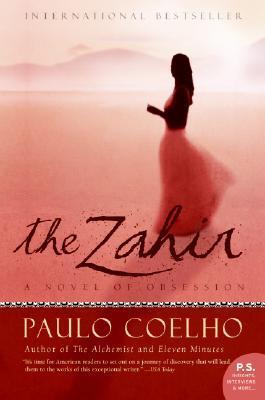As with the other Paulo Coelho books I have read, “The Zahir” left me with more to think about after reading than I actually understood while reading. (I think.)
"The Zahir" follows a best-selling novelist who is living in Paris when his wife of ten years suddenly disappears. It isn’t clear whether she has been kidnapped as a result of her often dangerous job as a war correspondent or whether she voluntarily ran away with her translator. The author, after discovering only her passport and some money gone, decides to presume the latter.
Two years later and still with a very much broken heart, the novelist is surprised by the translator, who has returned to give him the message that his wife is safe, happy, and doing something she loves.
With an inability to not track her down, the novelist’s search for the love of his life takes him down a spiritual path from which there is no return.
He follows the same path his wife did in order to be a bearer of love–to let love flow through him to others, which is every single human being’s duty, although the large majority have forgotten it.
When he finally realizes that the time is right to go back to his wife, his path leads him to the steppes of Kazakhstan, where she is living teaching French and weaving carpets.
I believe that each of Coelho’s novels has a unique message meant to encourage people to find their inner being, live through and with love, and be peaceful with the world. I am always amazed by the knowledge and insight that Coelho packs into his novels–the majority of which are less than 300 pages.

Como sucede con las otras novelas de Paulo Coelho que he leído, "The Zahir" me dio más para pensar despues de leerla que realmente entendí mientras estaba leyendo. (Creo.)
"The Zahir" sigue un novelista best-seller quien está viviendo en París cuando su mujer de diez años desaparece de repente. No está claro si ella la ha estado raptado como resultado de su trabajo peligroso como corresponsal de guerra o si huye con su traductor por su propia voluntad. El novelista, despues decubre que ha llevado su pasaporte y algún dinero, decide a presume el segundo.
Dos años más tarde y todaviá con corazón roto, el novelista está sorprendido por el traductor, quien ha retornado para darle un mensaje que su mujer está salva, feliz, y hace algo que le encanta.
Con una incapacidad para no ubicarla, la búsqueda del novelista para el amor de su vida se lleva por una senda spiritual de la cual no hay retorno.
Sigue la misma senda de la de su mujer para ser mensajero del amor–para permitir que el amor fluye por él a otros, lo que es la función de cada uno ser humano, aunque la mayoría lo ha olvidado.
Por fin cuando se da cuenta que es la hora para ir a su mujer, su sendero le guia a las estepas de Kazajistán, donde ella está viviendo, enseñando el francés y hilando las alfombras.
Creo que cada una de las novelas de Coelho, contiene un mensaje singular que debe animar la gente para encontrar su ser interior, vivir por el amor, y ser tranquilo con el mundo. Siempre estoy asombrada que el conocimiento y la percepción que Coelho embute en sus novelas–la mayoría de las cuales tiene menos que 300 páginas.